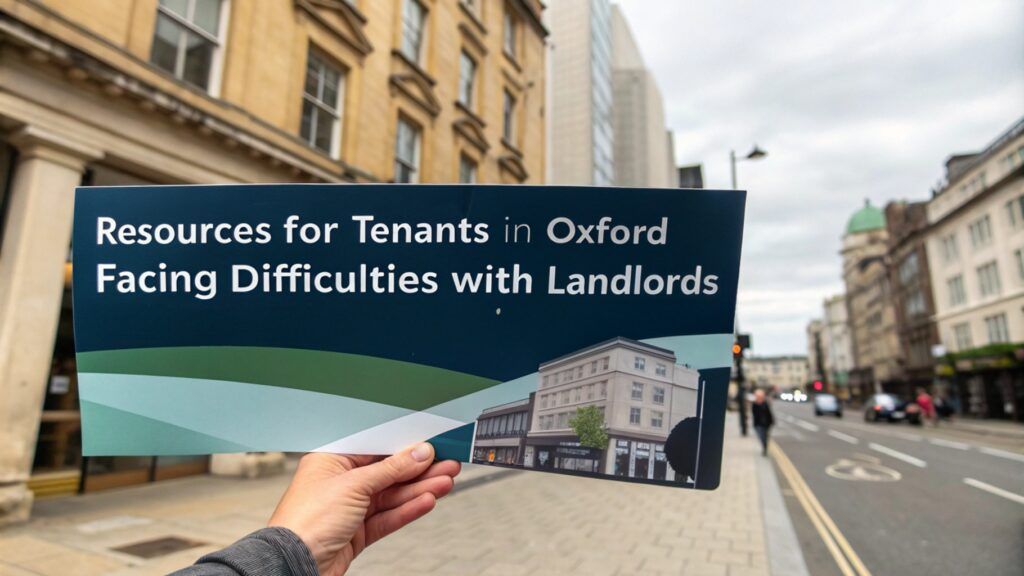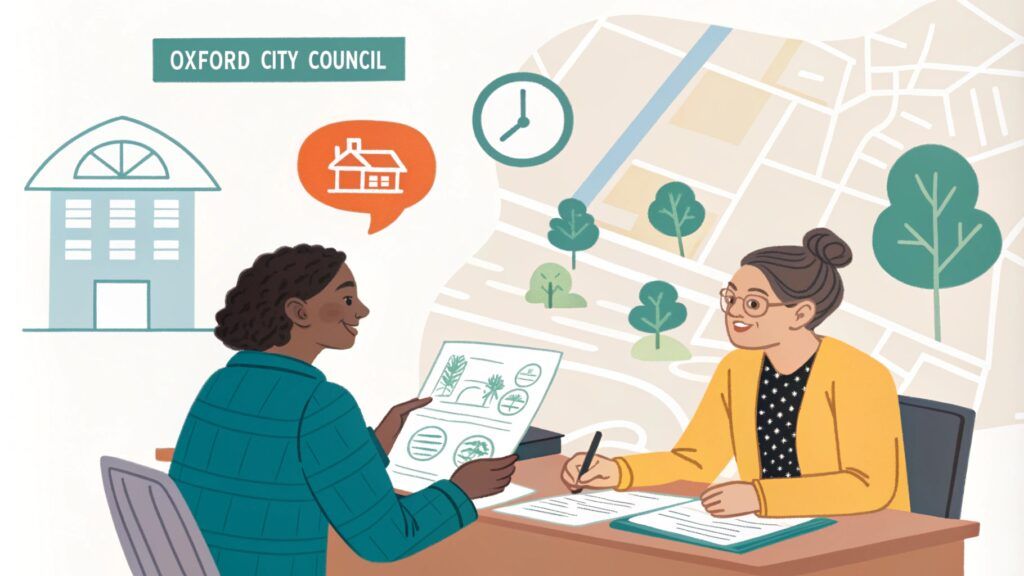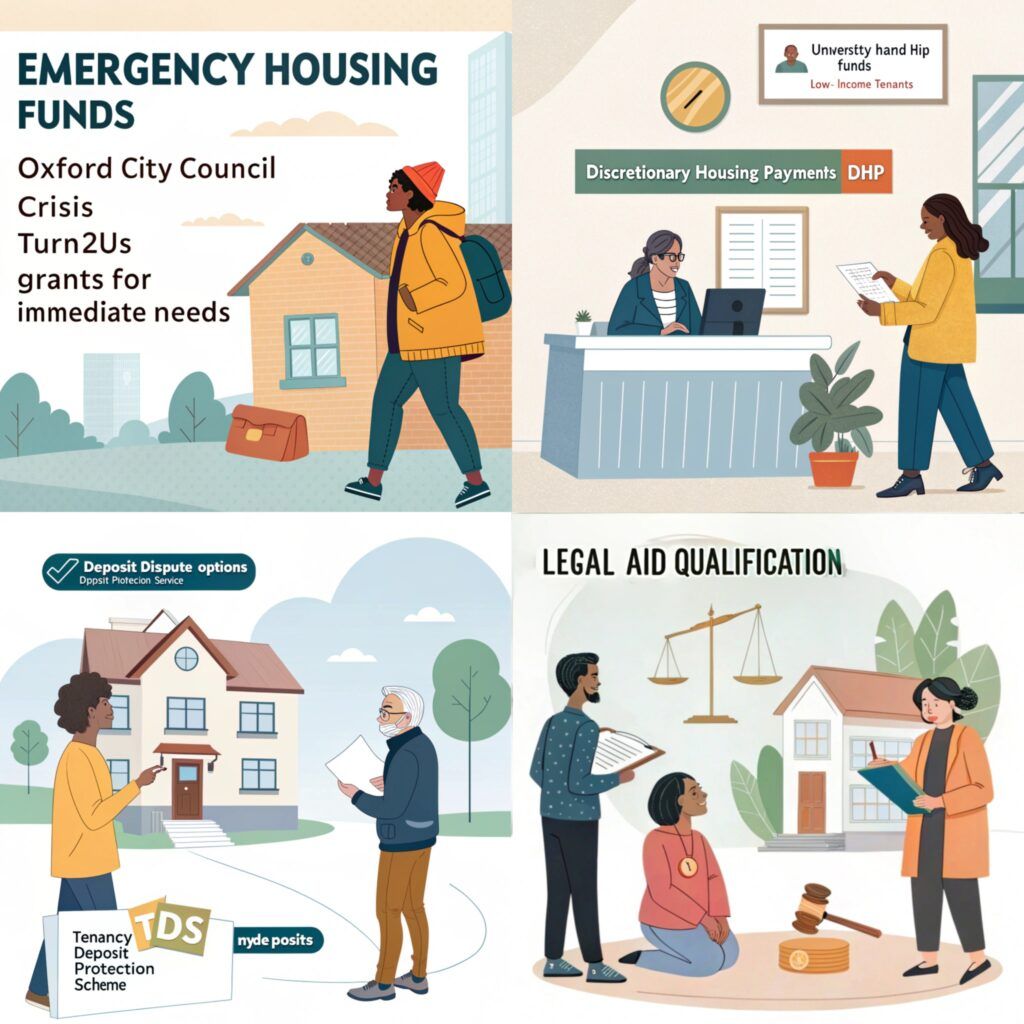
Navigating the rental market in Oxford can be a difficult task, especially if you end up in a dispute with your landlord. Whether you have to manage overdue repairs, unfair eviction notices, or negotiate deposit disputes, you may find yourself in a situation where you need support and guidance. Luckily, there are many resources in Oxford designed to help you and other renters protect your rights and resolve conflicts.
Legal advice sources
Tenant rights
Local authority support
Free support organizations
Mediation services
University student support
Case documentation
Financial assistance

Local law centres and clinics
Oxford Law Centre and similar community-based organizations are the first points of contact for prompt legal advice. They typically provide free or affordable consultations on tenancy disputes and help you understand your rights and solutions. Professionals are knowledgeable about unjustified evictions, rent disputes, and property owner negligence. You may book in advance, and some organizations also provide drop-in sessions for urgent issues.
University legal services
Students in Oxford can access legal advice through their university’s student union or advice centres. These services guide housing matters, such as deposit disputes, lease agreements, and landlord conflicts. For instance, students facing tenancy problems can reach out to Oxford University Student Union (OUSU)and Brookes Union Advice Service.
Oxford Student Union provides housing advice for students renting privately or choosing college housing. It offers guidance on housing-related problems, including deposit refunds and negotiating with landlords. They also put students in contact with Shelter—a specialist housing organization.
Online legal resources
There are many online platforms that students can access for legal information. Websites like Citizens Advice and Shelter are great places to start, as they offer detailed guides on tenants' rights, how to manage disputes, and what steps to take in case of innkeeper harassment or eviction threats. Many of these platforms also offer tools to write formal letters to homeowners or initiate claims. On Shelter’s website, for instance, you can get real-time advice through the live chat function.
Emergency Hotlines
For urgent matters, you may call emergency hotlines like the Shelter Helpline (0808 800 4444) or the National Homelessness Advice Service. They can help you with prompt guidance on illegal evictions, unsafe living conditions, and other critical situations. Alternatively, you can contact the local councils in Oxford that operate hotlines for housing emergencies. In case of landlord misconduct, they can intervene directly.
Connection Support offers a housing support service that prevents homelessness. It offers assistance with housing problems, benefits claims, and budgeting support for people and families over the age of 16 who reside in Oxfordshire.
Rental agreement essentials
As a tenant in Oxford, your rights start with the tenancy agreement—a legally binding document that contains the terms of your rental agreement. It must include important aspects such as the duration of the lease, the rent amount, notice periods, and any restrictions (e.g., on pets or subletting). You and your property keeper must agree on all terms. If you don’t receive a written agreement, you are still protected by statutory rights under the Housing Act 1988, which includes decent notice periods and protection against illegal eviction.
Property standards requirements
You have the right to live in a property that meets all legal standards for health and safety. This means properly functioning plumbing, adequate heating, secure locks, and compliance with fire safety regulations. According to the Housing Health and Safety Rating Systems (HHSRS), the property shouldn’t have serious hazards such as structural problems or damp. Homeowners in Oxford must offer properties that are fit for habitation throughout the entire lease.
Maintenance responsibilities
You must inform your property owner promptly about any problems. Ideally, you should do this in writing to have proof in case of deposit disputes. Even though you should handle the day-to-day upkeep, like keeping the property clean and managing minor wear and tear, it's your homeowner who has to address major repairs. Property owners or managers have to maintain the property and solve all repairs related to the structure, heating, plumbing, and electrical systems.
If your property manager or owner doesn’t fulfill their obligations, you may take the problem to the Oxford City Council or other relevant authorities.
Deposit protection rules
After you pay the deposit, your innkeeper must protect it in the government-approved Tenancy Deposit Scheme (TDS) within 30 days. They should also provide you with a certificate and details of the protection scheme. At the end of your lease, your property owner may deduct from the deposit only for valid reasons, such as damage beyond normal wear and tear, unpaid rent, or similar. In case you end up in a dispute with the homeowner keep in mind that TDS also offers free mediation services for resolving such issues.

Council housing team role
Local authorities in Oxford, such as the Oxford City Council Housing Team, are crucial in resolving landlord-tenant disputes. Not only do they offer advice on housing rights, but they can also mediate disputes related to tenancy agreements, harassment, or rent issues. Tenants who are at risk of homelessness due to eviction can also reach out to the council’s housing team. They can suggest options and help them access emergency accommodation.
Tenants can contact Oxford City Council regarding tenancy issues, including anti-social behaviour (Community Safety Team), support for council tenants, allocations, private renting matters (Housing Needs Team), and personal situations and disputes (Tenancy Management Officers).
Environmental health services
If your rental doesn’t meet health and safety standards, you can contact the Environmental Health Department. They manage problems like mould, damp, pests, and structural hazards under the Housing Health and Safety Rating System (HHSRS). If the property is deemed unsafe or inhabitable, environmental health officers will issue landlord improvement notices and require them to resolve the issues within a set timeframe.
Reporting procedures
You can contact the council directly through their website or by phone to report any proprietor misconduct or property concerns. Breaches of tenancy agreements, failure to address essential repairs or illegal eviction attempts are common issues. You will need to provide evidence, such as photos, repair logs, and written correspondence. If you're worried about retaliation from your innkeeper, rest assured that many councils offer anonymous reporting.
Enforcement actions
Local authorities can take enforcement actions if your homeowner doesn’t comply with their legal obligations. They can issue prohibition orders (to limit the use of unsafe areas in a property), improvement notices, or civil penalties for non-compliance. In extreme situations, councils can prosecute property owners under housing law. Under its Selective Licensing Scheme, Oxford City Council can address unlicensed or poorly managed properties.
Better Housing, Better Health is a network that focuses on minimizing fuel poverty and improving living conditions through cross-referrals among various organizations in Oxfordshire.
Citizens Advice Bureau Services
If you face housing problems, you can reach out to The Citizens Advice Bureau (CAB) in Oxford, which offers free, impartial, and confidential advice. They can help you understand your lease agreements, manage unpaid rent, deal with your innkeeper, and even guide you through legal processes like eviction notices. CAB also provides template letters and resources to resolve disputes. You can call them, visit their local office, or use their online chat services.
Housing charities
Charities like Shelter offer extensive support if you experience housing problems. Shelter offers free advice through its website, helpline, and face-to-face consultation. You can contact them for illegal evictions, unsafe living conditions, or harassment by property owners. If you are eligible, you can request legal representation in housing disputes.
Crisis and St. Mungo’s are also well-known charities that focus on helping people at risk of homelessness. They offer secure, stable housing.
Tenant Advocacy Groups
Tenant advocacy organizations, such as the National Union of Students (NUS) for students or Generation Rent, focus on protecting renters' rights. These organizations campaign for better housing standards and can guide you through deposit disputes, unfair rent increases, and repairs. They also help tenants contact legal advisors and host workshops to teach renters about their rights.
Community Support Networks
Local community groups, such as neighbourhood associations or housing co-ops, often offer peer support to tenants in Oxford. These networks help tenants share their experiences, access resources, and even organize collective actions against widespread landlord misconduct. You may also contact volunteer groups and faith-based organizations for advice, financial aid, or emergency housing solutions.
Tenants can engage with the Tenant Involvement Team, which offers consultations and tenant groups to improve community living conditions.
We recommend you opt for mediation services in the following scenarios:
Disputes over repairs or maintenance
If you deal with ongoing problems with the condition of your rental (unsafe living conditions, unresolved repairs, or similar issues), mediation will ease communication between you and your proprietor. It's a useful method when your property holder doesn’t respond to repair requests and you wish to resolve the problem without escalating.
Rent or deposit disputes
Mediation is an excellent option when you disagree over rent payments or deposit deductions. If your propriety owner illegally deducts from your deposit or demands a higher rent, mediation will help you reach a fair settlement and avoid expensive legal proceedings.
Breakdown of communication
If your communication with the innkeeper has become ineffective, mediation is one way to restore constructive dialogue. A neutral third-party mediator can conduct the conversation so that you and your landlord eventually reach an understanding and come to a mutually agreeable solution.
Desire to avoid legal action
More often than not, mediation is a quicker and more economical method to resolve disputes, especially when compared to taking legal action. With mediation, you avoid the stress, expense, and potential long-term impact of a court case. If you want to remain on good terms with your property holder, mediation is the best choice.
Risk of escalating issues
Once a dispute starts to escalate, mediation can help before the situation worsens. It’s particularly helpful in managing problems that could cause legal or financial issues down the road.
Costs
Compared to legal proceedings, mediation is affordable, and some services are even free, especially if provided by local councils or charities.
Process overview
Mediation is a structured process that a neutral third party facilitates to help both sides negotiate a resolution. Sessions can take place in person, over the phone, or online. Any agreement is documented in writing and can be presented in court, even if it’s not legally binding.

Success rate
Success rates range from 70% to 90% in housing disputes, based on the parties' willingness to cooperate. Mediation is particularly successful when communication has broken down, but the relationship is salvageable. The process is confidential, so discussions during mediation cannot be used in court, which enhances open communication and creative solutions.
University Housing Office
Most universities in Oxford, including the University of Oxford and Oxford Brookes University, have dedicated housing offices that help students with any accommodation-related issues. These offices offer guidance on tenancy agreements, advice on finding alternative housing, and even mediate disputes with landlords. To ensure student's safe and reliable accommodation, they also offer lists of vetted property owners or letting agencies.
Student Union Services
Student unions, such as the Oxford University Student Union (OUSU) and the Brookes Union, offer a range of support services tailored to housing challenges. Some unions also have dedicated caseworkers or advocacy teams to help students deal with difficult homeowners or housing emergencies.
College Welfare Teams
At the University of Oxford, each college has a welfare team that offers tailored support to students living in college-owned or private housing. These teams often include welfare officers, chaplains, and peer supporters who can help with housing-related stress and guide students to relevant resources. They may also liaise with innkeepers on behalf of students or suggest temporary solutions, such as emergency accommodations within the college.
International Student Support
International students may face unique challenges, such as navigating unfamiliar rental laws or dealing with cultural differences in landlord-tenant relationships. It’s common for universities to offer specialized international student support services, with practical advice on housing and legal issues. These services often include multilingual resources and staff who understand the unique needs of international students.
Record-keeping essentials
Effective documentation is paramount if you end up in a dispute with your innkeeper. You should organize your documents (rent payment receipts, tenancy agreement, communication with your property keeper, and any repair requests). Keep both digital and physical copies in a safe location, readily available to provide evidence if necessary.
Photography and evidence
When you document the property's condition, photos are crucial. Make sure you take clear, date-stamped photos or videos of any problems, such as mould, limescale, or damage as they occur. You should document the house's condition at the beginning and end of the tenancy to avoid disputes over deposits. Provide wide-angle shots and focus on specific problem areas.
Communication Logs
Maintain a detailed log of all communications with your property keeper or letting agent. Keep all emails, text messages, and notes from phone calls. Get written confirmation of any verbal conversations and save all correspondence as evidence in case of disputes.
Timeline documentation
Create a timeline highlighting the main events related to your dispute. Include dates of when you first noticed the problems and any responses or actions from your innkeeper. The chronological record clarifies how events took place and shows your efforts to resolve the situation. Timelines are useful when presenting your case to legal advisors, mediators, and local authorities.

Emergency housing funds
If you face urgent housing problems, such as homelessness or the threat of eviction, see if you qualify for emergency housing funds through the Oxford City Council or local charities. These funds offer temporary financial relief for unpaid rents or help you cover the cost of finding new housing. Crisis or Turn2us are charities that offer grants to people in immediate need.
Various local initiatives provide customized support plans for people dealing with housing crises to prevent homelessness.
Rent assistance programs
For tenants struggling to pay rent, Discretionary Housing Payments (DHP) are available through the local council. These payments are made to supplement housing benefits or universal credit for people with financial difficulties. Income, housing costs, and personal hardship are considered when deciding eligibility. Students or low-income tenants can seek help from university hardship funds or similar programs from their institutions.
Deposit dispute options
If your landlord abusively deducts from your deposit, you can seek free assistance through a Tenancy Deposit Protection Scheme (TDS), such as Deposit Protection Service (DPS) or MyDeposits. They offer independent adjudication to solve disputes. It's free to file a dispute through these services.
Legal Aid qualification
If you cannot afford legal representation, you may qualify for Legal Aid to cover costs for housing disputes, such as managing unsafe living conditions or defending against eviction. Factors like the nature of the case, savings, and income will weigh in for eligibility. Shelter or Citizens Advice can help you know if you’re eligible or not and put you in contact with legal aid solicitors.
RESOURCES
https://www.connectionsupport.org.uk/services/housing-support-service/
https://www.oxford.gov.uk/tenancy/contact-tenancy
https://www.oxfordsu.org/advice-wellbeing/housing/
https://www.oxfordshire.gov.uk/residents/social-and-health-care/help-housing
